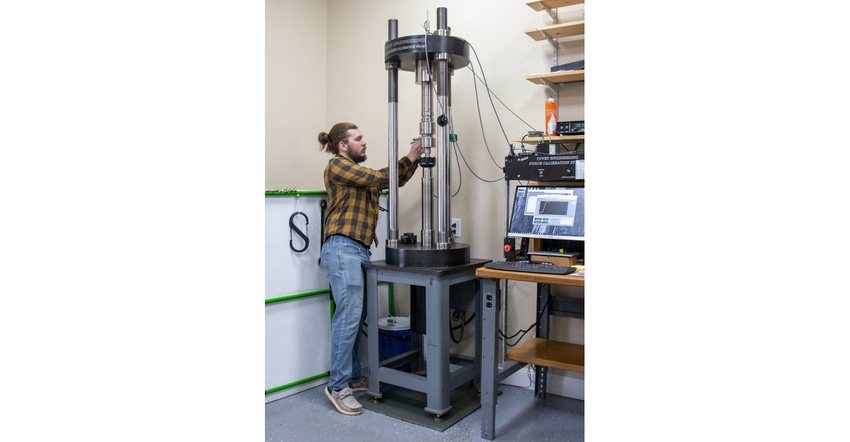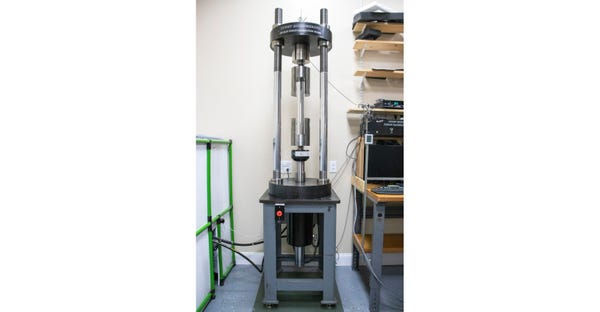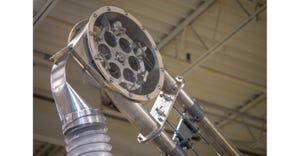Load cell calibration goes beyond the initial certification and is a vital step in ensuring accurate and reliable measurements.
May 24, 2023

Dara Trent, technical content director, Load Cell Central
In today's industrial landscape, load cells play a crucial role in accurately measuring forces and weights across various sectors. From manufacturing and construction to transportation and research, load cells are indispensable devices that ensure precise measurements.
To maintain reliability and precision, regular calibration of load cells and load cell-based systems is imperative. This article delves into the significance of load cell calibration and its impact on performance, safety, and overall operational efficiency in industrial processes.
Ensuring Accurate Measurements
At the core of load cell functionality is their ability to provide precise and accurate measurements of forces such as weight, pressure, and torque. Calibration is essential in establishing a known relationship between the applied load and the output signal produced by the load cell. Over time, load cells may experience drift, be influenced by environmental factors, or undergo wear and tear, leading to measurement deviations or inaccuracies. Regular calibration enables the identification and correction of these inconsistencies, ensuring that measurements remain within acceptable tolerances. This, in turn, provides reliable data for crucial decision-making processes, enabling businesses to make informed choices based on accurate information.
Enhancing System Performance
Load cell-based systems are often integrated into larger machinery or processes where accurate measurements are vital for optimal performance. Any errors or discrepancies in load cell measurements can significantly impact the overall performance of the entire system. Calibration helps identify and address systematic errors or inconsistencies, enabling the system to operate optimally. By maintaining accurate load cell measurements, system efficiency can be improved, reducing downtime, minimizing errors, and enhancing overall productivity. Proper calibration ensures that the system functions at its best, delivering reliable results and supporting seamless operations.
Compliance with Standards
Numerous industries have regulatory standards and quality control guidelines that govern the use of load cells and associated systems. Calibration is essential to ensure compliance with these standards and meet legal requirements. Regular load cell calibration allows businesses to demonstrate adherence to industry regulations, maintain certification, and avoid potential legal issues. Compliance not only ensures the integrity of measurement data but also enhances the reputation and credibility of the organization. By investing in load cell calibration, businesses can showcase their commitment to quality and compliance, fostering trust among customers, partners, and regulatory bodies.
Ensuring Personnel Safety
In industries where load cells are used to measure heavy loads, ensuring personnel safety is of paramount importance. Failure or malfunctioning of load cell-based systems can lead to hazardous situations, causing injury or property damage. Calibration plays a crucial role in identifying faults or malfunctions in load cells before they become safety hazards. By maintaining accurate load cell measurements, potential risks can be minimized, safeguarding the well-being of workers, and reducing the likelihood of accidents. Load cell calibration acts as a preventive measure, providing peace of mind to both employees and employers, knowing that the measuring systems are functioning accurately and reliably.
Extending Equipment Lifespan
Load cells are precision instruments that require proper maintenance and care. Calibration is an integral part of this maintenance routine. Through calibration, load cells can be checked for signs of wear and tear, ensuring they remain in optimal working condition. Detecting and rectifying any issues early on can prevent premature failure or damage to the load cell. By extending the lifespan of load cells through regular calibration, businesses can avoid the cost and inconvenience of frequent replacements, thereby optimizing their investments. Moreover, a well-calibrated load cell contributes to the overall longevity and performance of the equipment or machinery in which it is integrated, ensuring sustained productivity and reliability.
Facilitating Traceability and Audit Trails
In industries where traceability and audit trails are important, load cell calibration plays a significant role. Calibration records provide documented evidence of the accuracy and reliability of load cell measurements. This information is crucial for quality control, process improvement, and resolving disputes. Calibrating load cells and maintaining comprehensive calibration records enables traceability, allowing businesses to track measurement accuracy and ensure accountability throughout their operations. Whether it's ensuring compliance with industry standards, addressing customer concerns, or providing evidence in case of disputes, the availability of a complete calibration history instills confidence and demonstrates a commitment to precision and accuracy.

Why Load Cell Calibration is Necessary
Customers occasionally question the necessity of load cell calibration, especially when their load cells come with a certification. Some may believe that since the load cell is brand new, calibration is unnecessary, and they may be hesitant to pay extra for it, suggesting that they can handle the calibration themselves. However, load cell calibration goes beyond the initial certification and is a vital step in ensuring accurate and reliable measurements.
While load cells do come with a certificate that verifies their performance within factory specifications, it is essential to understand that each load cell has unique characteristics. The initial certification accounts for the load cell's nominal output and verifies its basic functionality. However, load cell electronics also have default mV/V calibration settings that are not specific to the individual load cell's output or capacity. Thus, calibration becomes necessary to establish accurate measurements.
Calibration can be performed theoretically by inputting the load cell's unique mV/V output or through live calibrations where a known load is applied to the load cell. Live calibrations are often preferred as they account for real-world conditions and provide more accurate results. During a live calibration, a calibration technician utilizes a hydraulic press to apply specific forces to the load cell while recording the corresponding outputs. As load cells operate linearly, the electronics can accurately determine the measured force.
On-site calibrations can be performed if certified weights are available, ensuring that load cells are calibrated as close to their capacity as possible. However, certain customers, specific applications, or high-capacity load cells may present challenges in achieving accurate on-site calibration. To address these challenges, calibration services are offered to customers before the load cell systems are deployed, ensuring accuracy and reliability from the outset.
Regular calibration of load cells and load cell-based systems is vital for accurate measurements, improved system performance, enhanced safety, compliance with regulations, and extension of equipment lifespan. Calibration ensures reliable and precise data for decision-making processes, contributes to operational excellence, and fosters a culture of quality and compliance. By investing in load cell calibration, organizations demonstrate their commitment to precision and reliability, gaining a competitive edge in their respective industries. Load cell calibration is not merely an expense but an essential practice that guarantees precise data and promotes overall success and credibility. It plays a crucial role in enabling accurate measurements, enhancing system performance, ensuring compliance, safeguarding personnel, extending equipment lifespan, and facilitating traceability and audit trails.
Dara Trent is technical content director, Load Cell Central (Milan, PA). For more information, call 570-731-7048 or visit www.800loadcel.com.
You May Also Like


